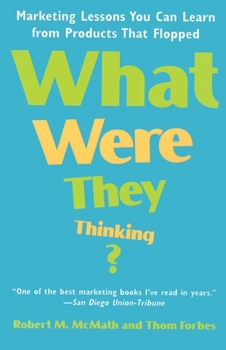What Were They Thinking?
Select Format
Select Condition 
Book Overview
Those ignorant of the mistakes of the past are bound to lose a lot of money. That's why Bob McMath founded the New Products Showcase and Learning Center--a "Smithsonian for Stinkers," Business Week... This description may be from another edition of this product.
Format:Paperback
Language:English
ISBN:081293203X
ISBN13:9780812932034
Release Date:July 1999
Publisher:Crown Publishing Group (NY)
Length:256 Pages
Weight:0.55 lbs.
Dimensions:0.7" x 5.5" x 8.4"
Customer Reviews
5 ratings
A goldmine
Published by Thriftbooks.com User , 19 years ago
This book is hysterical. I have absolutely nothing to do withmarketing, I got this book thinking it was about men (what werethey thinking?????) I got it, I read it from cover to cover,and everything he said is absolutely true. Marketers REALLY needto put themselves in the shoes of the consumer before puttinga product out there. Congrats Mr. McMath!
Model of good writing
Published by Thriftbooks.com User , 23 years ago
This book could be used by an English teacher as a model of good writing; it is clear, direct and easy to read. McMath's experience scripting concise and informative advertisements and labels shows. The emphasis on food products dominates, which limits the scope of this book somewhat. Nevertheless, the principles which are illustrated by these examples are sufficiently general to be of interest to most readers working in other areas. The book not only deals with failed products, but also presents examples of the right way to do things. It is nicely balanced and informative.
Must Reading for Marketeers
Published by Thriftbooks.com User , 23 years ago
This is an excellent book that tells all about the vagaries of new product development in the fast-moving consumer goods area. It is written with wit and humor, making it an easy read. It names names and is overflowing with case histories. If you're an entrepreneur, marketing person, PR/ad-agency creative or suit, you must read this book. It will save you time, money and embarrassment. It is absolutely true.
While we were sleeping...
Published by Thriftbooks.com User , 23 years ago
Ever wonder while wandering the aisles at your local supermarket, how in the world all those products make it to the shelf? There is no doubt about it, from your favorite kind of cereal to your regular brand of toothpaste; the packaged goods we choose to buy are the end result of a long, arduous and costly process. These products have been researched, re-formulated, re-designed, tested, re-tested, perhaps altered innumerable times before given the final approval to appear at your local shopping center. Not to mention the millions of dollars committed to ensure that we know about them through television, newspapers, magazines and other forms of media. It is a process that can take years, often beginning as an idea in someone¹s head, and ending with a tangible, three-dimensional package or container that ultimately holds the item we have chosen to give our allegiance, our loyalty. We form relationships with these products. We go far and wide, and to great lengths to find them, and are unhappy if we can't get them.Marketers everywhere are missing dinner with their kids, pulling all-nighters, steeped in market research and ad agency pitches, just so we could enjoy the most tasty cereal or the most whitening brand of toothpaste with baking soda. And these are only the products we know about; the ones that actually make it out the door! Ever wonder about the ones that never make it, or the ones that you saw today but are gone tomorrow, never to be seen again? Just ask Mr. Whipple. He's seen them come and seen them go. Charmin may still be "squeezably soft", but where is the Crystal Pepsi? Seemed like a good idea at the time. How about "smokeless" tobacco? Rabbit Jerky, anyone? Executives had countless meetings over these products, committed large amounts of resources to them, and spent millions of dollars to perfect and bring them to market. Unfortunately, most of them failed in the marketplace.How each of these came to market, as the brainchild of one or more marketers at nearly every consumer products manufacturer in the country, is quite a story. Steve Backer, the advertising executive best known for the "I'd Like to Teach the World To Sing" Coca-Cola jingle puts it in familial terms. Executives "parent" these ideas, like they would children, and they grow and are nurtured by "uncles" and "cousins" and even "grandfathers" and "godfathers". They develop benefactors, and are protected and defended. Sometimes defended too well. It is the process of how an idea ultimately becomes a reality, and the generic term we apply to this process is marketing.This is a subject of great interest to Robert McMath, a Marketing guru, i.e. consultant, who spent many years with the Colgate-Palmolive company, and Thom Forbes, an advertising journalist who, among other things, spent time as the editor of Adweek. In fact, they wrote a book about it, and the book is appropriately titled "What Were They Thinking? Marketing Lessons I¹ve
Hilarious tour of duff, abysmal and ill-thought out products
Published by Thriftbooks.com User , 23 years ago
If you want a good laugh and an invaluable lesson in how not to produce and market goods, this book is for you. The author, who has gradually built up a massive collection of products which seemed doomed to fail, discusses with admirable clarity where exactly the manufacturers went so badly wrong. Virtually every page is filled with nutty ideas which flopped, such as the ice cream sundae which had to be put into the microwave to heat up the sauce. Shame, therefore, that the packaging wasn't all that good and the ice cream started leaking out of the packet. A great book





